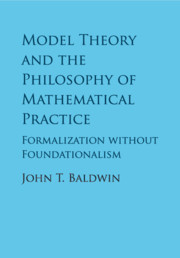Book contents
- Frontmatter
- Dedication
- Contents
- List of Figures
- Acknowledgments
- Introduction
- PART I REFINING THE NOTION OF CATEGORICITY
- PART II THE PARADIGM SHIFT
- PART III GEOMETRY
- 9 Axiomatization of Geometry
- 10 π, Area, and Circumference of Circles
- 11 Complete: TheWord for All Seasons
- PART IV METHODOLOGY
- References
- Index
11 - Complete: TheWord for All Seasons
from PART III - GEOMETRY
Published online by Cambridge University Press: 19 January 2018
- Frontmatter
- Dedication
- Contents
- List of Figures
- Acknowledgments
- Introduction
- PART I REFINING THE NOTION OF CATEGORICITY
- PART II THE PARADIGM SHIFT
- PART III GEOMETRY
- 9 Axiomatization of Geometry
- 10 π, Area, and Circumference of Circles
- 11 Complete: TheWord for All Seasons
- PART IV METHODOLOGY
- References
- Index
Summary
In Chapters 3.3 and 4.2, we discussed the gradual development of notions of completeness in the first third of the twentieth century. We recounted confusions amongst deductive and semantic completeness (for theories and/or logics) and categoricity. In this chapter we look from another angle on the distinction between descriptive and Gödel completeness and another sense of completeness identified by Kreisel. Today the difference between the topological and the logical notions of completeness is clear. But, since the topological notions are deeply entangled with categoricity concerns about the real numbers, the ideas intermingled at the beginning of the twentieth century.We discuss mathematical and logical attempts to clarify the notion from Dedekind to contemporary logicians.
We consider first Kreisel's ‘Logical foundations, a lingering malaise.’ A quick reading of the excerpt below might suggest Kreisel refers to the necessity of the Dedekind axiom for semantic completeness of Hilbert's geometry. But we argue he is actually referring to a deeper uneasiness on the part of Poincaré. Kreisel remarks of Hilbert's rules for geometry:
True, [they] provided a genuine surprise at the time, and it does not seem to be well-known that Poincaré still doubted the completeness of Hilbert's rules. Presumably everybody else did too who had taken Kant's view on the role of visualization (Anschauung) in mathematical reasoning literally (that is, some kind of logical need) and not in the sense of effective use – a distinction already stressed earlier. [Kreisel 1984]
In the first paragraph of the piece, Kreisel had identified one element of the malaise: ‘a preoccupation with a universal framework (a universal language, for example) and thus with logical possibilities. This preoccupation is at the heart of the malaise; it concerns a potential conflict between pursuing these logical ideas and effective knowledge.’
In his review of the 1899 edition of the Grundlagen, Poincaré wrote,
But this geometry, strange to say, is not quite the same as ours, his space is not our space, or at least is only a part of it. In the space of Professor Hilbert we do not have all the points which there are in our space, but only those which we can construct by ruler and compass, starting from two given points. In this space, for example, there would not exist, in general, an angle which would be the third part of a given angle.
- Type
- Chapter
- Information
- Model Theory and the Philosophy of Mathematical PracticeFormalization without Foundationalism, pp. 250 - 258Publisher: Cambridge University PressPrint publication year: 2018



